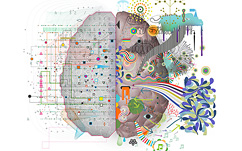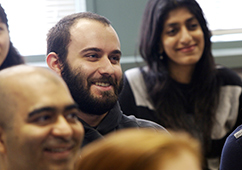Departments and Institutes
Jump to a Section
Academic Departments
Biomedical Engineering
With cutting-edge research in neural engineering, cardiovascular and pulmonary engineering, materials and tissues, and imaging and biophotonics, the BME department affords students and researchers a variety of advanced learning opportunities in engineering, life sciences, and mathematics.
Chemical and Biological Engineering
While creating global impact in the areas of sustainable energy, molecular engineering, materials, complex systems, biotechnology, and synthetic biology, the ChBE department prepares students to become leaders in entrepreneurship, medicine, law, government, and education.
Civil and Environmental Engineering
Providing an exceptional range of opportunities for research and study in areas such as geotechnics, mechanics of materials and solids, structural engineering and infrastructure materials, and more, the CEE department encourages students to become masters of infrastructure and stewards of the environment.
Computer Science
By expanding the number of renowned faculty and developing state-of-art facilities, the Department of Computer Science offers students an educational experience like no other, with the potential to spark new fields of study through interdisciplinary collaborations with fields like literature, art, medicine, and economics. Computer science innovations touch artificial intelligence, machine learning, human-computer interaction, robotics, and more.
Electrical and Computer Engineering
The Department of Electrical and Computer Engineering prepares the next generation of engineers for work in digital design, computer hardware and architecture, robotics, microprocessors, and software design. Students conduct groundbreaking research to develop new electronic devices, design novel information processing algorithms, and integrate hardware and software to create cutting-edge systems.
Engineering Sciences and Applied Mathematics
Applied mathematicians perform cutting-edge research using mathematical modeling to solve interesting and challenging problems, specifically in the physical, biological, and social sciences. Some of ESAM’s cross-disciplinary research topics include biomechanics, biofilms, combustion theory, financial mathematics, geophysics, molecular biology, and wave phenomena.
Industrial Engineering and Management Sciences
The IEMS department seeks to improve the productivity and quality of production and service systems by considering their design, analysis, and implementation. The department’s interdisciplinary research includes simulation and engineering statistics, new methodologies, and the rigorous solution of difficult problems in production, logistics, financial engineering, healthcare, and organizational systems analysis.
Materials Science and Engineering
Established more than 50 years ago as the first materials science academic department in the world, the MatSci department at McCormick continues to lead the field. With ample opportunity to collaborate and conduct pioneering, cross-disciplinary research, our students become leaders in academia, entrepreneurship, industry, and professional organizations.
Mechanical Engineering
The future of mechanical engineering focuses on the design of energy-efficient systems that integrate traditional knowledge with emerging disciplines to invent the next engineering masterpieces. The ME department prepares students for the future by providing opportunities for interdisciplinary research in nanomaterials, advanced sensing, adaptive and responsive systems, rapid prototyping, molecular rotors, and biomechanical interfaces.
Major Centers and Institutes
Browse some of the leading centers and institutes at McCormick and Northwestern. You can also view a complete list of our research centers and institutes.
Segal Design Institute
Segal educates the next generation of design innovation leaders. By providing collaborative, project-based coursework in its interdisciplinary academic programs and state-of-the-art equipment in facilities such as the Prototyping and Fabrication Lab, Segal enables its undergraduate and graduate students to work at the forefront of innovation and human-centered design.
Farley Center for Entrepreneurship and Innovation
Endowed in 2008, FCEI advances interdisciplinary learning by integrating different disciplines and faculty to develop new curriculum and areas of empowerment, outreach, and research. Through Farley courses such as NUvention, students experience the entire innovation/business life cycle - from ideation to prototyping and business plan development.
Northwestern Institute on Complex Systems
NICO serves as a hub and facilitator for collaborative, relevant research in the area of complexity science, transcending the boundaries of established disciplines. Founded in 2004, it aims to uncover the fundamental principles governing complex systems in science, technology, and human behavior and apply these principles to solve societally relevant problems through the analysis, design, and control of complex systems.
Center for Leadership at Northwestern University
The Center for Leadership provides a host of opportunities and resources for Northwestern students to develop their leadership skills and experience, including courses and a certificate program, a fellowship in leadership for PhD students, online assessments, leadership coaching, and other customized services.
Northwestern University Transportation Center
Established in 1954, the Transportation Center pursues the long-term improvement of domestic and international systems for the movements of materials, people, energy, and information. Recognized as a leading interdisciplinary and research institute, it serves industry, government and the public through its research, graduate programs, and outreach.



